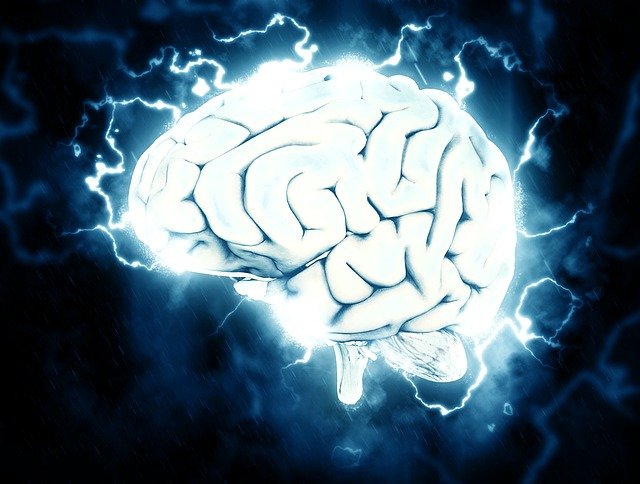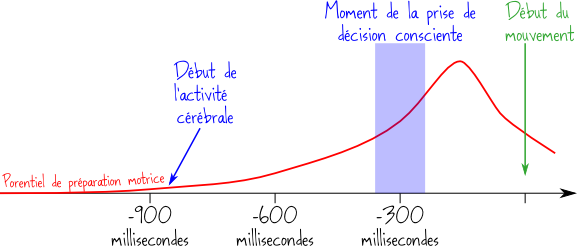When neuroscience shows that free will doesn't exist... *(sorry)*
Men believe that they are free because they are aware of their desires but ignorant of the causes that determine them.
Spinoza
All my life I wondered how my choices were made. Sometimes I felt like I was being pushed by an irresistible force.
I remembered few days ago reading something about free will and I managed to find you the website that helped me write this blog post.
In fact,"Our brain gives us the illusion of controlling our actions the illusion of controlling our actions".
Severals neuroscience experiments show that it is possible to detect brain activity that allows us to predict what a person's decision will be made... before they are aware that they have made that decision!!
Isn't that incredible?
It's like Love... everything is science. I'm sorry to put the mood on... I must confess that I was shocked too.
Because as David Louapre would say on the blog Science Etonnante, If tomorrow they show me that in choosing his wife, we are playing with brain processes in which the conscience plays only a secondary and useless role, and that we can approach those of reflexes, it would affect me a little anyway!
What is Free Will ?
According to Wikipedia,
Free will is the ability to choose between different possible courses of action unimpeded.
Free will is closely linked to the concepts of responsibility, praise, guilt, sin and other judgements which apply only to actions that are freely chosen. It is also connected with the concepts of advice, persuasion, deliberation and prohibition. Traditionally, only actions that are freely willed are seen as deserving credit or blame. There are numerous different concerns about threats to the possibility of free will, varying by how exactly it is conceived, which is a matter of some debate.
We distinguishes free will from reflexes because: free will involves many brain areas, unlike reflexes that travel on simple neural pathways. This is what we will see at the point: free will and neurological activity.
What do neuroscientists say?
The Libet experiment
The first known experiment on this subject was carried out in 1983 by neuroscientist Benjamin Libet, who carried out an experiment in which he asked participants to move their fingers whenever they wanted to.
Simple? And yet... This allows him to observe two facts:
- When these participants make the decision to move their fingers
- The time when participants actually move their fingers
As you know, it takes a while for the brain to send the information to the finger to move (+- 200ms). But what you don't know and what only the electroencephalogram can show is that there is an electrical activity in the brain - which is called "potential for motor preparation" since it is the signal that will prepare the movement - well before the person makes his decision to move his fingers... In fact, +- 400 ms BEFORE the decision is made, and therefore 600 ms before the finger makes the decision.
Here is the experience of Libet explained in drawing :
You're going to tell me... that these are automatic behaviours like not having to think about our every move while driving.
However, it's not that simple... And what you notice may even influence our most important choices in life (such as his wife's choice for our friend David from the amazing Science blog or for you, your career choice and your children, their choice of studies).
But Libet's experience disturbs... So she faces a lot of criticism. And above all, we need to reassure ourselves: YES, we do have a free will (and yes, I fall in love with whoever I want! to link it to my previous post).
More recent experiences
Without wanting to be cold behind your back, other similar experiences followed... Based on the same principle. And here, the results go further. In 2008, scientists were able to predict (thanks to an MRI, not because they are soothsayers!) which hand (right or left) would choose the person tested to lift their finger.
And now there's something really troubling! And the criticisms of the Benjamin Libet experiment are over.
On the other hand, to reassure you, it is necessary to note that the predictions made by the MRI works best in 60% of cases. This means that all is not totally lost for our free will...
And what will this show when MRIs are more powerful than they are today?
To see the experience made on a person:
Moral consequences
To say that free will does not exist means that we are not responsible for our actions... But imagine that no one is responsible for their actions, justice would no longer know how to apply the laws... And the world would no longer go round and round. So, our scientists come here to titillate the moral and allow us to philosophize. This type of study, frankly, is frankly controversial. But one thing is certain... It is that knowing this will not leave us indifferent.
Sources
- Livre : Le Cerveau Volontaire de Marc Jeannerod (2010)
- https://sciencetonnante.wordpress.com/2012/03/05/le-libre-arbitre-existe-t-il/
- http://homofabulus.com/le-libre-arbitre-nexiste-pas/
- https://fr.wikipedia.org/wiki/Libre_arbitre
- https://www.letemps.ch/sciences/2012/08/30/libre-arbitre-existe
- http://webinet.cafe-sciences.org/articles/notre-conscience-serait-elle-politiquement-incorrecte/


Very good post you, i try to understand from all post form, so that i can be the best like you, i am very amazed with you ,, you are very genius in making post.saya hope someday nantik you victorious
Happy nwe yars 2018